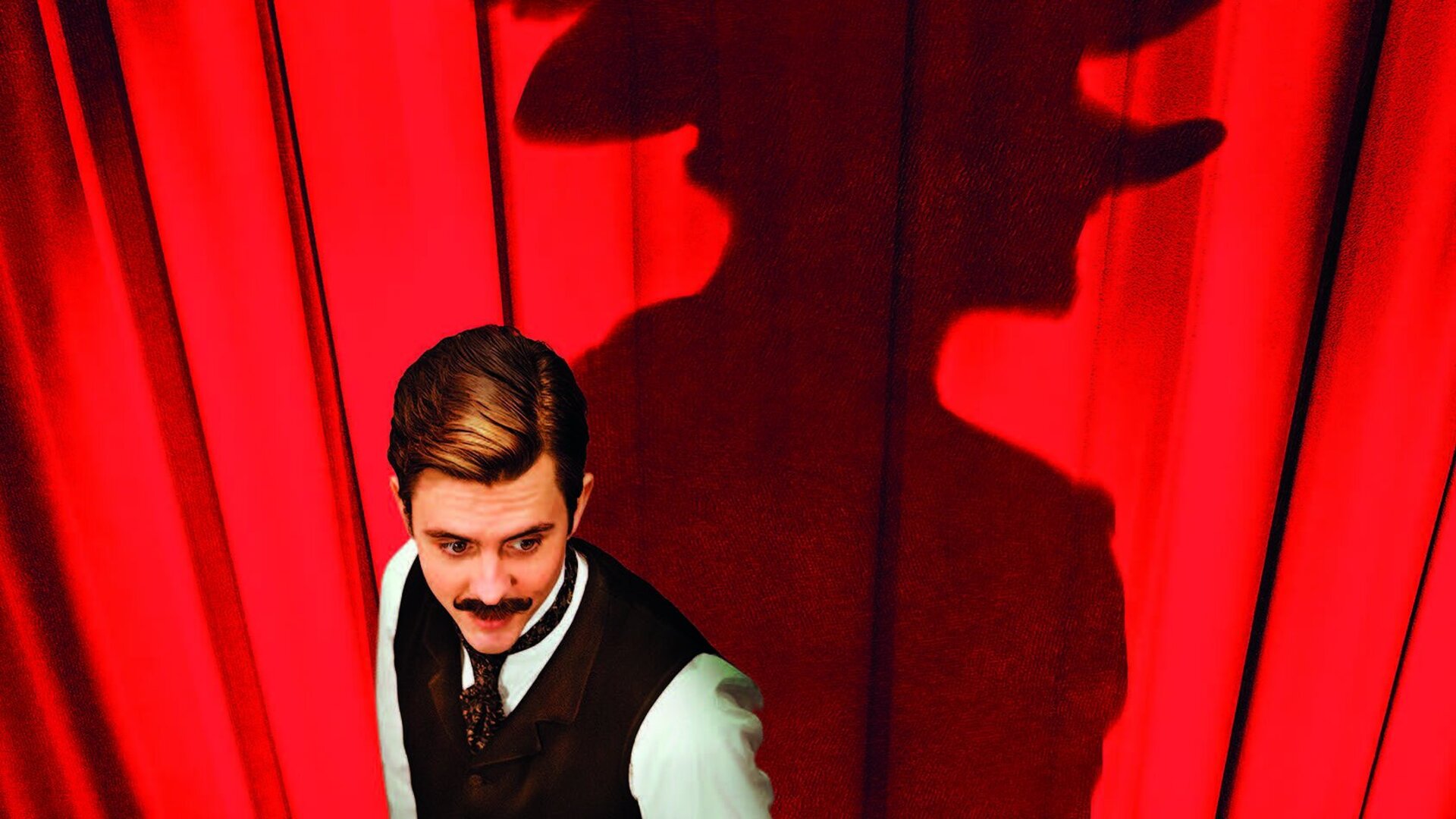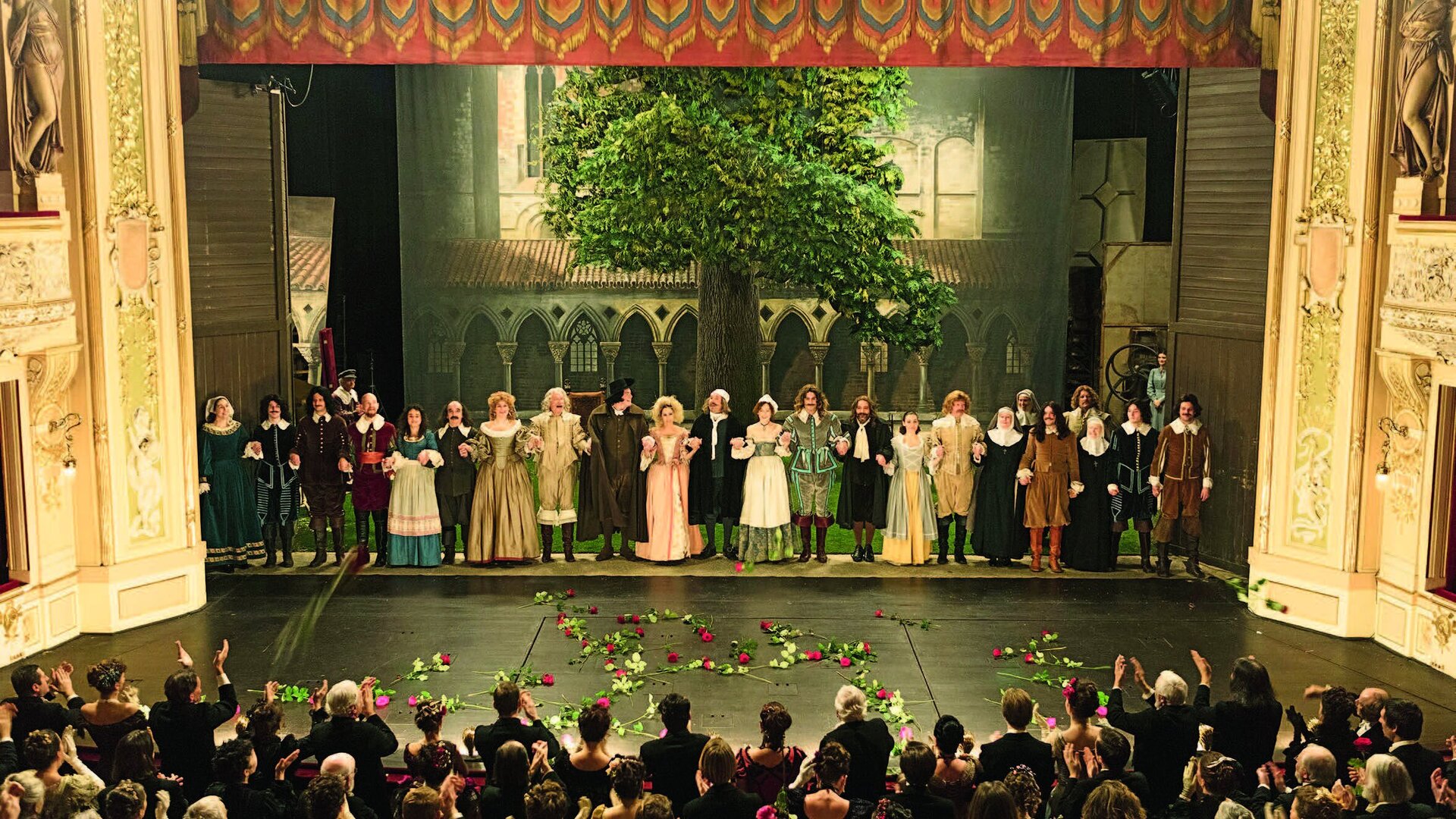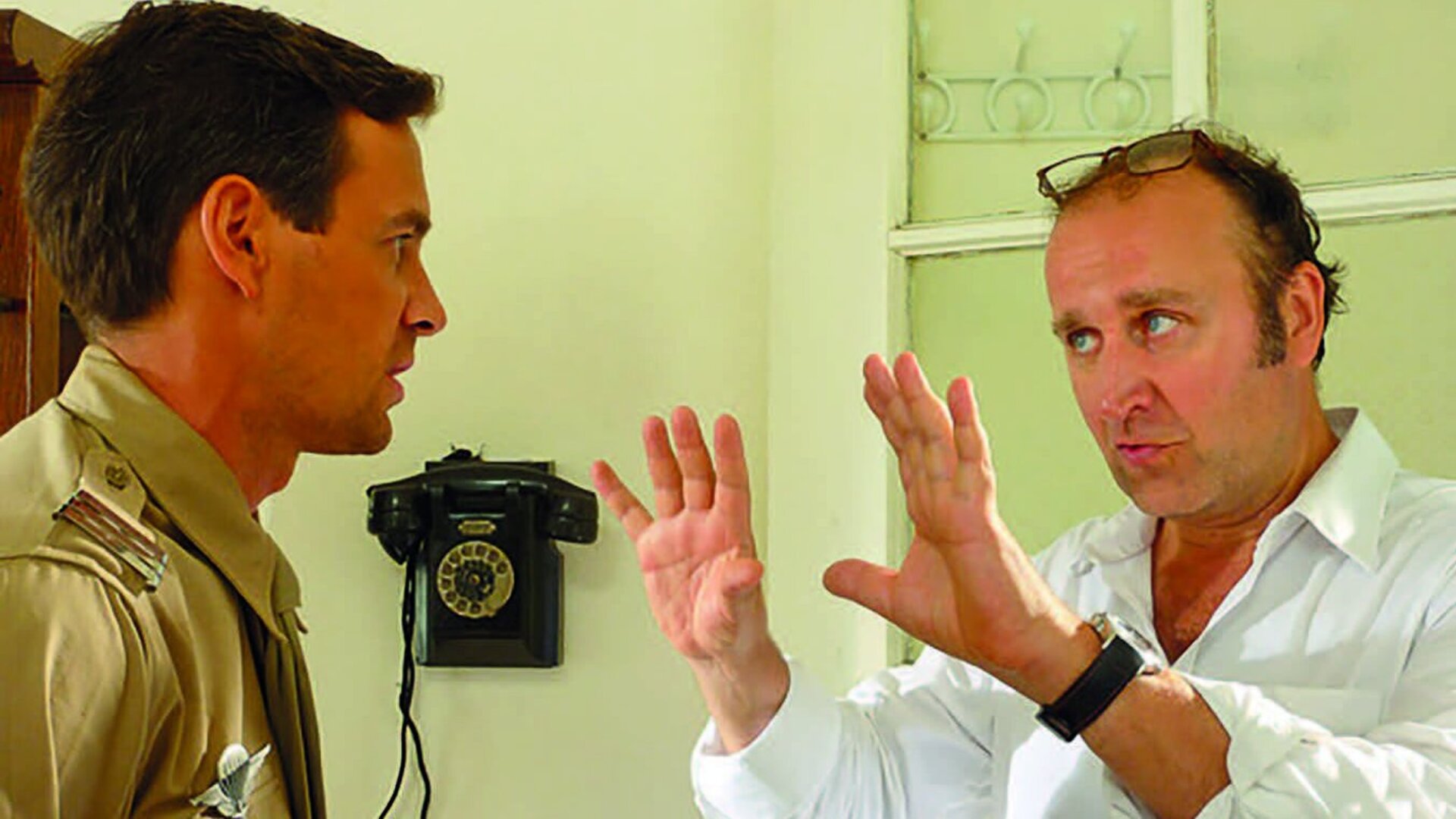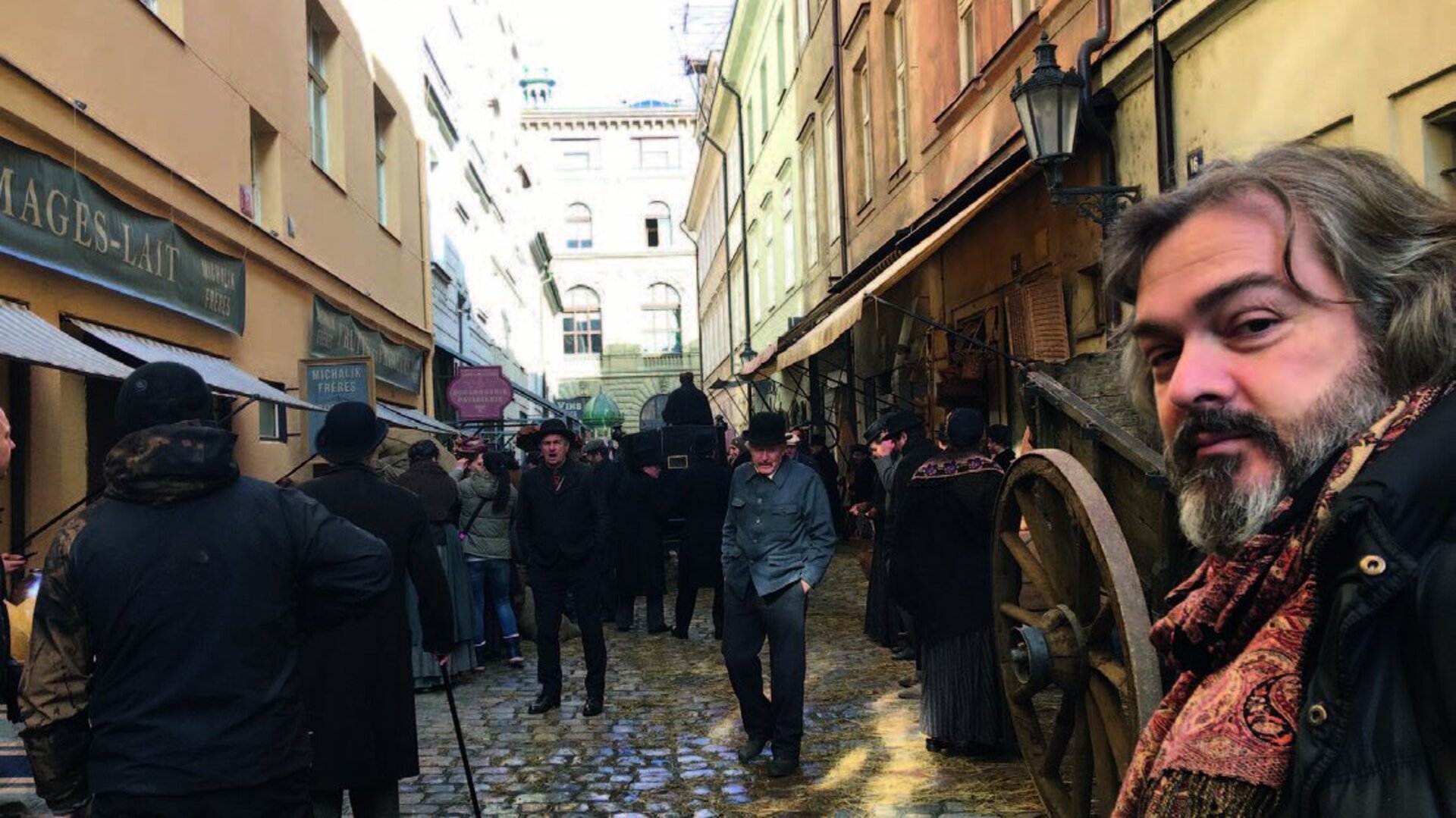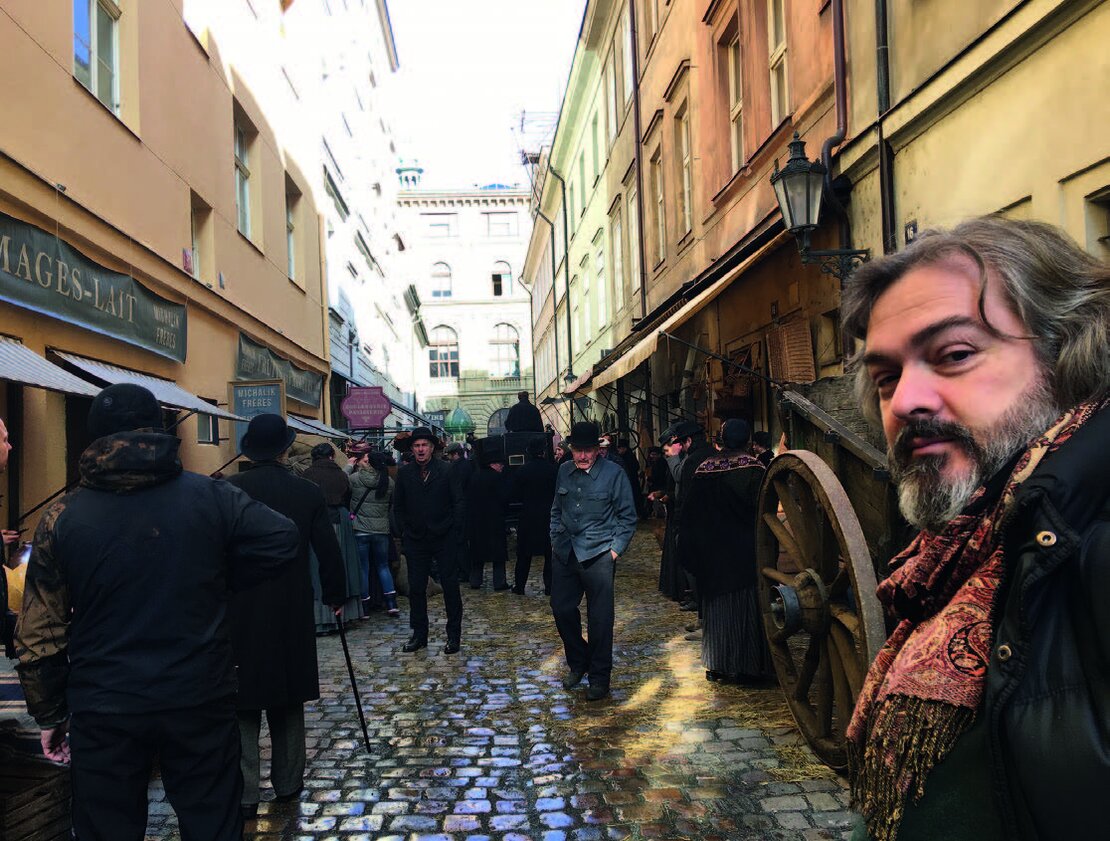France's most frequently performed play has not only written theatre history, it has also been made into a film several times. The lead role is Cyrano de Bergerac, whom many excellent actors have tried to interpret. Not only in France, where Gérard Depardieu's portrayal of Cyrano in 1990 (the movie was nominated for five Oscars, including Depardieu himself, who was awarded an Oscar for best costume) is certainly the one that will be remembered most, but on German stages it would probably be the interpretation of Cyrano by Klaus Maria Brandauer at the Burgtheater or Boy Gobert at the Thalia Theater Hamburg.
In his stage play, Alexis Michalik tells the story of how the Cyrano was created as a dashing comedy, and similar to the Cyrano, Edmond becomes the poet for a fellow actor in the play for a mutual lover, who then turns out to be Edmond's very personal muse for the play. Against all odds, and really all of them, the Cyrano becomes a success. The play about the creation of a play was and is a great success in France. Michalik became a celebrated theatre director and in addition to "Edmond" he has did four other very successful plays in his home country, despite the criticism of the literature fans who didn't want to accept that Edmond Rostand and the genesis of Cyrano became the subject of an almost completely freely invented comedy, in which almost nothing corresponds to the historical truth. The theatre audience couldn’t care less, and the movie had more than 500,000 visitors in France (theatrical release in January), but from the producers' point of view it fell short of expectations.
The first assistant director involved in the project was Michael Viger, who can look back on a successful career as assistant director and director. He has worked with the greats of French cinema, and at first glance you neither can tell that he is an Austrian citizen, nor that he is Viennese. His father is a French film composer, his mother originates from a Viennese family of entrepreneurs (the fashion store "Brieftaube" at the “Graben” in the city centre is perhaps still a well-known name), and Michael grew up mainly in France. At the moment he’s living in Vienna with his son, commuting between shooting in France and Belgium and preparing his first feature film in Austria as a director. And because we are very strict with the compliance rules: The author of these lines is also involved in this feature film as producer and screenwriter.
Back to "Edmond", which was shot in Prague last year. The tax shelter model and the much lower price level, which has a dramatic effect especially on mass scenes and historical costume films, make Prague very attractive for international productions. In "Edmond" not only the costumes had to be taken in consideration, but also a large number of extras that were necessary for the scenes in the theatre, for example. Plus, Prague can be sold excellently as the Paris of the Fin de Siècle, the districts below the Hradschin and the other buildings in the city have been undamaged since the monarchy and are now also freshly renovated and fully in life.
“In the credits of "Edmond" you are mentioned with a single credit as 1stAssistant Réalisateur very far ahead. Is this position in France a higher one than what we in Austria would call an "assistant director"?”
Michael Viger: “In France, the assistant is an employee at the director's department who is involved from end to beginning, from design to colours and the decoration to the shooting schedules and even almost all stages of the script. We are not as independent as, for example, in England or America, but are very closely connected with the director, and still more independent than an assistant. In "Edmond" I was also 2nd Unit Director. Alexis is an amazing young director, whom I really enjoyed working with for his first feature film, as I was able to contribute a lot of my experience.”
“The director of "Edmond" made a movie of his successful play, but it was his first feature film - do you often work alongside rather inexperienced directors?”
“I’m lucky to have a long and successful career in which I have worked with great directors such as Henri Verneuil, Sally Potter, Florent Emilio Siri and Randall Wallace. I learned a lot from them, for example the importance of accurate preparation, or the magic of creating a scene, of working with actors to turn an idea into reality. If you work with a young director as an assistant director, the producer, but also the director, expect you to contribute your experience. That's why they are looking for someone with experience.”
“Ludovic Bernard was also present at the festival in Vienna with his new film, and he was a first assistant director for a very long time as well. Do you know each other?”
“Ludovic was a great assistant, he worked for Luc Besson for a very long time. Thanks to Besson he had the opportunity for his first directing jobs. I was very pleased because he has an amazing talent and I like his movies very much. However, we don't know each other personally and we haven't met each other yet, but we certainly would have a lot to talk about.”
“Aren’t you a bit of a competitor, especially when it comes to directing?”
“No, not really, we both worked as first assistant directors on a level where there aren't many left. We both took the chance to direct our own films, but our styles differ and fortunately the spectrum is very broad, that means there is room for both of us.”
“French cinema is based on a star system - whoever recruits certain stars can apply for the better grants. Is this really a good idea?”
“Unfortunately, this system has existed for a very long time, and it means that a good story is not enough. In order to finance a film and, for example, get major television stations on board, you need a celebrity cast. Fortunately, we have great actors in France and Europe. But unfortunately, it also means that we can't give newcomers and new faces enough opportunities. It’s our job to discover new talent, to find a new Dépardieu, a new Belmondo, a new Kinski.”
“For Austrians, France looks like paradise: a quota, at least 30 percent of French films must be screened, far more money in the funding pools and an audience that loves going to the cinema. Last year the number of visitors in France increased - in contrast to Austria.”
“In recent years, the number of visitors in France has been around 200 million per year, it is without doubt the best film market in Europe. This also means that statistically speaking, every Frenchman goes to the cinema almost three times a year. Film culture has always been part of French leisure activities. Whether in times of crisis or in times of economic boom, the French laugh, cry and grumble, but they go to the cinema - and then laugh and cry and grumble at and about the cinema. Of course, cinema in France has also developed well under the influence of overseas and Asian cinema.”
“Only a few people know that you are an Austrian citizen, but you grew up in France and are therefore more of a French "phenomenon". Do both worlds feel like home to you?”
“To be quite honest, France doesn’t feel more like home than Austria, because home is where I feel good. I grew up between Vienna and Paris and I love both cultures, both histories, which are shaped by art. But I also love and live the conflicts that have shaken and separated us. Nowadays I have the desire to shoot films and to contribute all my experience as a filmmaker”.
“Which world feels more like home at the moment?”
“I have found love and peace in Austria. It is a country with enormous potential, and I consider it a privilege to be able to shoot my first feature film here.”
“Your parents live in Morocco, which is also a place to feel “at home”, isn't it?”
“Morocco is part of France's history. North Africans still have this extremely strong connection to France, French is often still their second language. My passionate interest is also reflected in a script that deals with the extraordinary history that Algeria and France have, for example. Of course, I love to visit my parents in Morocco, and I feel comfortable there, but for me it is always an encounter with the history of France.”
“France is also considered the inventor of great cuisine, great red wines, baguettes and croissants - do you miss those things in Vienna as a "Frenchman"?”
“May I be a little poetic? Cuisine and wine are the golden line of epicureism. It is in our genes, and this pursuit of pleasure is reflected in everything I do. I paint, I make music, I write, and I make films. Everything passes through the stomach. Every feeling must be digested and felt. Cooking is the story, wine is the scent of a film, a wonderful cocktail that has to be elegant and finely balanced to inebriate the senses with our knowledge as a chef.”
“What do you know about Austrian film?”
“When I was a child, my grandparents and I watched nearly all Austrian films with the wonderful Hans Moser. I acknowledged a great know-how in the fields of rhythm, music, comedy and staging. I think this sensitivity has developed into a harsher and more realistic cinema. Haneke is of course a great international director, we talked several times about working together, but unfortunately it never worked out due to lack of time, which I regret very much. I learned a lot about the new Austrian cinema from Karl Markovics to Stefan Ruzowitzky and I think it’s very interesting.”
“You are currently commuting between Vienna and Brussels because you are the first assistant director for a film by Marc Fitoussi. In May the shooting will be held in Vienna, what’s the film about?”
“We are shooting a classic French film. It’s a social thriller set in the French community in Vienna. The couple Eve and Henri have nothing to complain about, he is a respected conductor; she works at the Institute Français. A happy ever after story, until Henri falls in love with his son's teacher. Eve then gets involved in an affair with a young Austrian, but the French comedy suddenly turns into a thriller.”
“Where will the filming take place?”
“Since the film is co-financed with Belgian money, we are shooting a lot of interior scenes in Brussels, but the exterior shots will be shot in Vienna in mid-May. The MS Stadt Wien, a paddle wheel steamer of the old DDSG, which is still privately owned and is used as an excursion ship on the Danube, will also be part of the movie, and the showdown will be filmed in the harbour at Kuchelau. But we will also be filming at the Burgtheater, at the Cafe Sluka and on several other places in Vienna. We would like to shoot more in Vienna, but Belgium has a very attractive financing model, which of course benefits the production.”
“What has shaped you the most? Your father is well known as a film composer in France; therefore, you grew up with this lifestyle, right?”
“I still remember very well that I accompanied my father to recordings at an old theatre in the heart of Paris when I was a child. I loved to spend some time alone in the back room of the empty theatre, because for me the theatre was filled with ghosts and wonderful stories. I created incredible worlds in my head, without any limits, only thanks to my imagination. My family gifted me this love for music, painting and cinema, I am very happy to be able to paint, play music and make films. It is no coincidence that I have met producers in Austria with the same wish: to tell stories and make wonderful, great films.”
